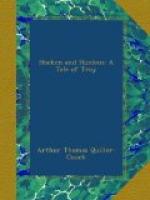“I heard Mr Rogers say t’other day, ’Never marry a widow unless her first husband was hanged.’”
“Pray let us change the subjeck,” said Mrs Bowldler hastily.
“Why? . . . What did Mr Bowldler die of? I’ve often meant to ask,” said Fancy, “and then again I’ve wondered sometimes if there ever was any such person.”
“There was such a person.” Mrs Bowldler half-closed her eyes in dreamy reminiscence. “Further than that I would not like to commit myself.”
“He’s dead, then?”
“He was a fitter in a ladies’ tailorin’, and naturally gay by temperament. It led to misunderstandin’s. . . . Dead? No, not that I am aware of. For all I know he’s still starrin’ it somewhere in the provinces.”
She protested that for the moment she must drop the subject, which invariably affected her with palpitations; but promised to return to it in confidence when she felt stronger.
Throughout these days, however, and for many days to come, she discoursed at large on the diplomacy of widows; warning Palmerston to shape his course in avoidance of them. And that budding author—who had already learnt to take his good things where he found them—boldly transferred her warnings to the pages of ‘Pickerley,’ which thereby arrived at resembling ‘Pickwick’ in one respect if in no other.
From these generalities she would hark back, at shortest notice, to the practical present.
“It behoves us—seein’ as how a tempory cloud has descended between these two establishments—it behoves us, I say, to watch out for its silver lining in one form or another. Which talking of silver reminds me of electro, and I’ll ask you, Palmerston, if that’s the way to leave a mustard-pot and call yourself an indoor male?”
Their estrangement had endured some three months before the rivals came again into public collision.
The beginning of it happened through a very excusable misunderstanding.
Is Christmas Day to be reckoned as an ordinary day of the week, or as a Sunday, or as a dies non? The reader must decide.
Christmas Day that year fell on a Friday—one of the three week-days tacitly allotted to Cai, who may therefore be forgiven that he chose to reckon it as coming within the ordinary routine. He did so, and at about three o’clock in the afternoon (which was bright and sunny) he reached the small gate of Rilla, to be aware of ’Bias striding up the pathway ahead of him.
He gave chase in no small choler.
“Look here,” he protested, panting; “haven’t you made some mistake? This is Friday.”
“Christmas Day,” answered ’Bias, wheeling about.
“I can’t help that. ’Tis Friday.”
“An’ next year ’twill be Saturday,” retorted ’Bias with a sour grin; “it that’ll content you, when it comes. None of us can’t help it. Th’ almanack says ‘tis Christmas Day, and ord’nary days o’ the week don’t count. Besides, ’tis quarter-day, and I’ve brought my rent.”




